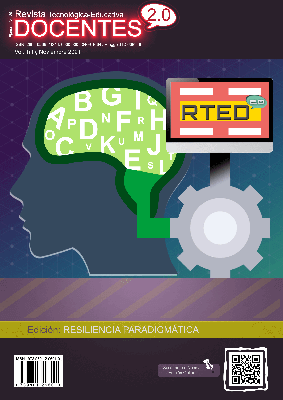Classification of Digital Tools in Technoeducation
 DOI:
https://doi.org/10.37843/rted.v1i1.257
DOI:
https://doi.org/10.37843/rted.v1i1.257
Main Article Content
Abstract
The emergence and advancement of technology in the last decade of the 20th century opens up new opportunities for the educational process. The purpose of this research was to determine the classification and the evolution of digital tools to optimize the pedagogical model of the virtual classroom Teachers 2.0, this being a safe, motivational and experiential tool in the didactic-pedagogical task. A diagnosis was applied, benefited from a methodology according to the study objectives, being awarded a type of descriptive research in a field design. A questionnaire was used for a population of 35 respondents (5 teachers, 30 students), the data were tabulated, they also deciphered and externalized the results through tables of relative frequency distributions, in addition, the percentages for each indicator, reflected using graphics; providing answers to the study questions. Consequently, the reached conclusions and recommendations constitute the contribution and importance; in turn, it was possible to reveal the weaknesses in the Virtual Classroom in terms of the ignorance of classification and even characteristics of the digital tools by the students. Specialist teachers. At the same time, an established “precedent” about studying educational, technological resources.
Downloads
Metrics
Article Details

This work is licensed under a Creative Commons Attribution-NonCommercial-NoDerivatives 4.0 International License.
Those authors who have publications in our journal accept the following terms:
- When a work is accepted for publication, the author retains rights of reproduction, distribution of his/her article for exploitation in all countries of the world in the format provided by our magazine and any other magnetic medium, optical, and digital.
- Authors will retain their copyright and guarantee the journal the right first to publish their work, which will be simultaneously subject to the Creative Commons Acknowledgment License (Attribution-NonCommercial-NoDerivatives 4.0 International (CC BY-NC-ND 4.0)). That allows third parties to copy and redistribute the material in any medium or format, under the following conditions: Acknowledgment - You must properly acknowledge authorship, provide a link to the license, and indicate if any changes have been made. You may do so in any reasonable way, but not in a way that suggests you have the licensor's endorsement or receive it for your use. NonCommercial - You may not use the material for a commercial purpose. NoDerivatives - If you remix, transform, or build from the material, you cannot broadcast the modified material. There are no additional restrictions - You cannot apply legal terms or technological measures that legally restrict you from doing what the license allows.
- Authors may adopt other non-exclusive license agreements to distribute the published version of the work (e.g., deposit it in an institutional archive or publish it in a monographic volume) provided that the initial publication in this journal is indicated.
- Authors are allowed and recommended to disseminate their work through the Internet (e.g., in institutional telematic archives, repositories, libraries, or their website), producing exciting exchanges and increasing the published work's citations.
- Request of withdrawal an article has to be done in writing by the author to the Editor, becoming effective after a written response from the Editor. For this purpose, the author or authors will send correspondence via e-mail: [email protected].
- The author will not receive financial compensation for the publication of his work.
- All Docentes 2.0 Journal publications are under the Open Journal System (OJS) platform at: https://ojs.docentes20.com/.
References
Ander-Eggs, E. (1987). Técnicas de investigación social. Editorial Humanitas.
Arias, F. (1999). El Proyecto de Investigación: Guía para la Elaboración (3ª. ed.). Editorial Episteme.
Baechle, T. R., Earle, R. W. (2007). Principios del entrenamiento de la fuerza y el acondicionamiento físico. 2ª edición. Editorial Médica Panamericana.
Bavarezco, A. (1997). Proceso Metodológico de la Investigación: Cómo Hacer un Diseño de Investigación. Imprenta Internacional C.A.
Bisquerra, R. (1998). Método de Investigación Educativa. España: CEAC.
Cabero, J. (1998). Usos de los Medios Audiovisuales, Informáticos y las Nuevas Tecnologías en los Centros Andaluces. Grupo de Investigación Didáctica.
Depreau, C. (1997). Aprendizaje Total. Editorial Kapaluz.
Henderson, J. (1992). Reflective Teaching: Becoming an Inquiring Educator. Mac Millan.
Méndez, C. (2003). Metodología. Diseño y desarrollo del proceso de investigación. (3ª ed.). McGraw-Hill Interamericana Editores S.A.
Mujica-Sequera, R. [Docentes 2.0] (2020). Educación a distancia en tiempo de pandemia [video]. YouTube. https://youtu.be/Qsi0F4HOaOQ
Mujica-Sequera, R. (2016). Estrategia audiovisual en la optimización del modelo pedagógico e-learning. Grupo Docentes 2.0 C.A.
Palella-Stracuzzi, S. & Martins-Pestana, F. (2012). Metodología de la investigación cuantitativa. 3ra Edición. FEDUPEL.
Sabino, C. (1986). Metodología de la investigación. https://bianneygiraldo77.wordpress.com/category/capitulo-iii/
Sabino, C. (2002). El Proceso de Investigación. Editorial Panapo.
Seisdedos, N. (2004). Cambios.T est de flexibilidad cognitiva. TEA ediciones.
Stake, R. E. (2005). Investigación con estudio de casos. Morata.
Yin, R. (2009). Case Study Research, desing and mhetods. (Fourth edition). SAGE.






